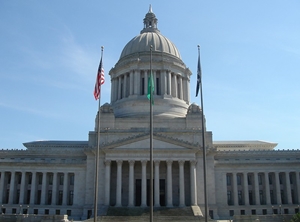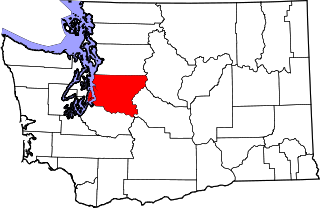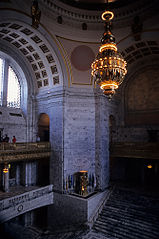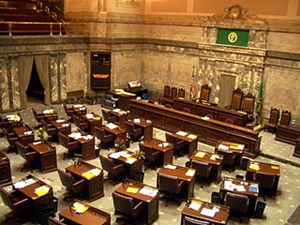April 27, 2015 •
WA Legislature Plans Special Session Beginning April 29, 2015
The 2015 regular session of the Washington State Legislature adjourned sine die on April 26, 2015. However, legislators did not come to an agreement on the state’s budget. Therefore, the Legislature will convene a special session on Wednesday, April 29, […]
 The 2015 regular session of the Washington State Legislature adjourned sine die on April 26, 2015.
The 2015 regular session of the Washington State Legislature adjourned sine die on April 26, 2015.
However, legislators did not come to an agreement on the state’s budget.
Therefore, the Legislature will convene a special session on Wednesday, April 29, 2015, in order to complete the budget process.
Photo of the Washington State Capitol by Nicopoley on Wikimedia Commons.
April 22, 2015 •
Special Session Imminent for WA Legislature
The Washington State Legislature appears to be headed to a special session if state lawmakers cannot come to an agreement on the state budget before April 26, 2015, the session deadline set by the state constitution. The source of the […]
 The Washington State Legislature appears to be headed to a special session if state lawmakers cannot come to an agreement on the state budget before April 26, 2015, the session deadline set by the state constitution.
The Washington State Legislature appears to be headed to a special session if state lawmakers cannot come to an agreement on the state budget before April 26, 2015, the session deadline set by the state constitution.
The source of the disagreement stems from public school funding in light of recent state Supreme Court case McCleary v. State of Washington, where the Court mandated a new funding scheme for public schools by the end of the 2015 legislative session.
Gov. Jay Inslee acknowledged the need for a special session but indicated details have not been discussed.
Photo of the Washington State Capitol by Nikopoley on Wikimedia Commons.
April 9, 2015 •
Exec. Director of WA’s Public Disclosure Commission Resigns
Effective May 31, 2015, the executive director of the Public Disclosure Commission, Andrea McNamara Doyle, is resigning. McNamara Doyle has served as executive director of the PDC since August 2011. According to an agency spokeswoman, the resignation is voluntary and […]
 Effective May 31, 2015, the executive director of the Public Disclosure Commission, Andrea McNamara Doyle, is resigning. McNamara Doyle has served as executive director of the PDC since August 2011.
Effective May 31, 2015, the executive director of the Public Disclosure Commission, Andrea McNamara Doyle, is resigning. McNamara Doyle has served as executive director of the PDC since August 2011.
According to an agency spokeswoman, the resignation is voluntary and is likely the result of frustrations stemming from budget constraints and downsizing.
The PDC will meet April 9, 2015, at 1:30 p.m. to begin searching for McNamara Doyle’s replacement.
The Pierce County Superior Court invalidated a Washington campaign finance law requiring free legal advice given to a recall campaign to be treated as a reportable campaign contribution. Judge Katherine Stolz reasoned pro bono representation in civil rights cases would […]
 The Pierce County Superior Court invalidated a Washington campaign finance law requiring free legal advice given to a recall campaign to be treated as a reportable campaign contribution. Judge Katherine Stolz reasoned pro bono representation in civil rights cases would be threatened if such representation must be reported as a campaign contribution and therefore subject to applicable state political contribution limits.
The Pierce County Superior Court invalidated a Washington campaign finance law requiring free legal advice given to a recall campaign to be treated as a reportable campaign contribution. Judge Katherine Stolz reasoned pro bono representation in civil rights cases would be threatened if such representation must be reported as a campaign contribution and therefore subject to applicable state political contribution limits.
As a result of the ruling, the Public Disclosure Commission cannot cap legal services to political committees in a federal civil rights case, nor can it compel political committees to report free legal services as campaign contributions.
January 12, 2015 •
WA Legislature Considers Revolving Door Ban
A new ethics bill scheduled to be proposed in the Washington Legislature would impose a revolving door ban on state legislators, statewide elected officials, and directors of cabinet-level agencies. The proposal was developed by Attorney General Bob Ferguson and Rep. […]
 A new ethics bill scheduled to be proposed in the Washington Legislature would impose a revolving door ban on state legislators, statewide elected officials, and directors of cabinet-level agencies.
A new ethics bill scheduled to be proposed in the Washington Legislature would impose a revolving door ban on state legislators, statewide elected officials, and directors of cabinet-level agencies.
The proposal was developed by Attorney General Bob Ferguson and Rep. Reuven Carlyle, D-Seattle.
The bill would impose a “cooling off” period, where said officials could not lobby state government for one year after leaving office.
Photo of the Washington State Capitol by Nicopoley on Wikimedia Commons.
October 15, 2014 •
WA Ethics Board Limits Free Meals for Legislators
The Washington Legislative Ethics Board held a board meeting on October 14, 2014 to finalize rules defining “infrequent occasions” in the context of free meals accepted by state legislators. Section 42.52.150(5) of the Revised Code of Washington allows public officials […]
 The Washington Legislative Ethics Board held a board meeting on October 14, 2014 to finalize rules defining “infrequent occasions” in the context of free meals accepted by state legislators. Section 42.52.150(5) of the Revised Code of Washington allows public officials to accept gifts in the form of food and beverage on infrequent occasions so long as attendance at such a meal is related to the performance of official duties. The Board voted unanimously to define infrequent occasions as up to 12 meals total per calendar year.
The Washington Legislative Ethics Board held a board meeting on October 14, 2014 to finalize rules defining “infrequent occasions” in the context of free meals accepted by state legislators. Section 42.52.150(5) of the Revised Code of Washington allows public officials to accept gifts in the form of food and beverage on infrequent occasions so long as attendance at such a meal is related to the performance of official duties. The Board voted unanimously to define infrequent occasions as up to 12 meals total per calendar year.
The scope of the rule is limited to food and beverage paid for by a registered lobbyist or lobbyist employer. A qualifying meal under the rule is breakfast, lunch, or dinner, regardless of cost, when the guest would normally be expected to sit down and eat, such as in a restaurant or private residence.
The Board was careful to maintain the exceptions in the Ethics Act permitting public officials to accept complimentary food and beverages at hosted receptions and in other limited circumstances.
This rule takes effect January 1, 2015.
October 8, 2014 •
King County, Washington Council Passes Living Wage Ordinance
On Monday, October 8, 2014, the Metropolitan King County Council passed an ordinance establishing a living wage. Ordinance 2014-0299 applies to all county employees and to county contractors with contracts totaling more than $100,000. Beginning April 1, 2015, Schedule I […]
 On Monday, October 8, 2014, the Metropolitan King County Council passed an ordinance establishing a living wage. Ordinance 2014-0299 applies to all county employees and to county contractors with contracts totaling more than $100,000.
On Monday, October 8, 2014, the Metropolitan King County Council passed an ordinance establishing a living wage. Ordinance 2014-0299 applies to all county employees and to county contractors with contracts totaling more than $100,000.
Beginning April 1, 2015, Schedule I employers, which are companies with more than 500 employees in the U.S., must pay their employees $11 per hour. The hourly living wage rate will increase on January 1, 2016, to $13 per hour or $12.50 if the employer contributes to its employees’ health plan. The hourly wage will increase yearly as provided in the ordinance until 2018, when all further increases will be tied to the national inflation rate. Beginning January 1, 2019, payment by the employer of health benefits will no longer affect the hourly rate.
Schedule II employers, which are companies with 500 or fewer employees in the U.S., must pay their employees $10 per hour. Beginning January 1, 2016, the hourly rate increases yearly to reach $17.25 by 2024. Beginning January 1, 2025, Schedule II employers must pay their employees a living wage equal to that of Schedule I employers.
The living wage ordinance applies to any contract over $100,000 entered into on or after April 1, 2015, the effective date of the ordinance.
August 20, 2014 •
WA Ethics Board Votes to Allow Legislators 12 Free Meals Per Year
The Washington Legislative Ethics Board has come to a preliminary conclusion as to how to define “infrequent occasions” as it relates to free meals accepted by the state’s legislators. Section 42.52.420 of the Revised Code of Washington allows public officials […]
 The Washington Legislative Ethics Board has come to a preliminary conclusion as to how to define “infrequent occasions” as it relates to free meals accepted by the state’s legislators. Section 42.52.420 of the Revised Code of Washington allows public officials to accept gifts in the form of food and beverage on infrequent occasions so long as attendance at such a meal is related to the performance of official duties.
The Washington Legislative Ethics Board has come to a preliminary conclusion as to how to define “infrequent occasions” as it relates to free meals accepted by the state’s legislators. Section 42.52.420 of the Revised Code of Washington allows public officials to accept gifts in the form of food and beverage on infrequent occasions so long as attendance at such a meal is related to the performance of official duties.
When the Legislature failed to pass any pertinent legislation defining infrequent occasions before its adjournment on March 13, 2014, the Legislative Ethics Board took up the issue. During its August 19, 2014, meeting, the board decided in a 5-3 vote to define infrequent occasions as 12 free meals per year. Under the proposed rule, a qualifying meal occurs when the guest would normally be expected to sit down and eat, such as in a restaurant or a private residence, as opposed to a legislative reception.
Other provisions of the rule, including a reporting requirement for legislators accepting free meals, are still under discussion. A final vote on the rule is scheduled for October 21, 2014.
June 17, 2014 •
WA Legislative Ethics Board Considers Infrequent Occasions
Section 42.52.420 of the Revised Code of Washington allows public officials to accept gifts in the form of food and beverage on infrequent occasions. In recent months, “infrequent occasions” has come under scrutiny after a widely-read report showed the state’s […]
 Section 42.52.420 of the Revised Code of Washington allows public officials to accept gifts in the form of food and beverage on infrequent occasions. In recent months, “infrequent occasions” has come under scrutiny after a widely-read report showed the state’s 50 most active lobbyists treated legislators to meals totaling more than $65,000 over a four-month period.
Section 42.52.420 of the Revised Code of Washington allows public officials to accept gifts in the form of food and beverage on infrequent occasions. In recent months, “infrequent occasions” has come under scrutiny after a widely-read report showed the state’s 50 most active lobbyists treated legislators to meals totaling more than $65,000 over a four-month period.
After the Legislature failed to pass any pertinent legislation before its adjournment on March 13, 2014, the Legislative Ethics Board took up the issue. The board held a meeting on June 17, 2014, to review proposals received from the public related to how to define infrequent occasions.
All of the proposals considered by the board would require legislators to file a report upon receiving a free meal. Stricter proposals set the dollar amount threshold for reporting the meal at $5 and the amount of free meals per year at three to five. Others set the threshold at $25 and allow 52 free meals per year. One especially ambitious proposal would require a reduction in a legislator’s per diem allowance for every free meal he or she accepts.
The board will continue to take public comment on the issue and will reconvene on August 19, 2014, to further consider public proposals.
Despite highly publicized criticism of a Washington law allowing legislators to accept meals from lobbyists on “infrequent occasions”, the Washington State Legislature failed to pass any bills addressing the ambiguity before its adjournment in March. Senate Bill 6414 contained a […]

Despite highly publicized criticism of a Washington law allowing legislators to accept meals from lobbyists on “infrequent occasions”, the Washington State Legislature failed to pass any bills addressing the ambiguity before its adjournment in March. Senate Bill 6414 contained a provision requiring the Legislative Ethics Board to define “infrequent occasions” and further required the development of an electronic reporting system enabling lobbyist reports to be searched electronically by the public.
This bill and others did not make it out of committee before the legislature adjourned and will not carryover to the next session. As a result of the legislature’s failure to pass any pertinent legislation, the Legislative Ethics Board has independently taken on the task of defining “infrequent occasions”.
The Board will hold a public meeting Tuesday, April 15 at 12 p.m. in Hearing Room 3 of the John A. Cherberg Building, 298 15th Avenue SW, Olympia, Washington. Board Chair Kristine Hoover set the meeting to listen and gather information from the public and to get public feedback on what the word “infrequent” should mean.
January 27, 2014 •
Washington Senate Bill 6414 Mandates Electronic Filing, Public Availability of Reports
Senate Bill 6414, introduced this week by a group of Washington senators led by Senator Joe Fain, requires all reports to be filed electronically. The bill contains several other strictures, including requiring the Public Disclosure Commission to make all filings […]

Senate Bill 6414, introduced this week by a group of Washington senators led by Senator Joe Fain, requires all reports to be filed electronically. The bill contains several other strictures, including requiring the Public Disclosure Commission to make all filings available on its website, mandating each lobbyist or lobbyist’s employer sharing in an expenditure greater than $25 to report the specific dollar amount of his or her share, and requiring all lobbyist filings to include an itemized list of all payments made to a state official, regardless of dollar amount.
Another section of the bill implores the Ethics Board to define the limits of “infrequent occasions” in the context of the acceptance of gifts of food and beverages by public officials from lobbyists. This section of the bill comes after a widely-read report showing the state’s 50 most active lobbyists pampered legislators with meals totaling more than $65,000 over a four-month period.
A final section of the bill allows lobbyists to avoid reporting expenses for a legislator’s food at a meeting with the lobbyist if such expenses were paid by the legislator.
Photo of the interior of the Washington State Capitol courtesy of Eric Hunt on Wikimedia Commons.
January 27, 2014 •
Washington Senate Bill Prohibits Political Contributions While Legislature is Out of Session
Senate Bill 5988, introduced January 13, 2014, would prohibit state officials from soliciting or accepting political contributions in odd-numbered years when the legislature is out of session but has not adopted or submitted to the governor a biennial operating appropriations […]

Senate Bill 5988, introduced January 13, 2014, would prohibit state officials from soliciting or accepting political contributions in odd-numbered years when the legislature is out of session but has not adopted or submitted to the governor a biennial operating appropriations act.
The bill would further prohibit the governor or any person employed by the governor from soliciting or accepting contributions during the period provided for the consideration of bills under the Washington constitution.
Photo of the Washington State Senate Chamber courtesy of Lincolnite on Wikimedia Commons.
January 2, 2014 •
WA Legislative Ethics Board Dismisses Complaint, Looks to Legislature for Guidance on Free Meals to Lawmakers
The Legislative Ethics Board in Washington dismissed a complaint related to Washington state lawmakers accepting free meals from lobbyists. Washington law prohibits public officials from accepting free meals on more than “infrequent occasions.” However, there is no enforceable standard for […]
 The Legislative Ethics Board in Washington dismissed a complaint related to Washington state lawmakers accepting free meals from lobbyists. Washington law prohibits public officials from accepting free meals on more than “infrequent occasions.” However, there is no enforceable standard for “infrequent occasions.”
The Legislative Ethics Board in Washington dismissed a complaint related to Washington state lawmakers accepting free meals from lobbyists. Washington law prohibits public officials from accepting free meals on more than “infrequent occasions.” However, there is no enforceable standard for “infrequent occasions.”
The complaint was prompted by a reported $65,000 being spent on free meals by the state’s most active lobbyists in the first four months of 2013.
The Ethics Board is turning to the Legislature for an enforceable standard for the ethics law. If the Legislature fails to do so in the upcoming session beginning in January, the board plans to establish its own rules.
The board also noted in its decision the lack of an enforceable standard affects the consistency of lobbyist reports in terms of what is being reported.
Photo of the Washington State Capitol by Nikopoley on Wikimedia Commons.
November 21, 2013 •
WA AG Pursues Lawsuit against Grocery Manufacturers Association after Defeat of I-522
Although Initiative 522 was ultimately defeated in an election several weeks ago, State Attorney General Bob Ferguson is moving forward with a lawsuit against the Grocery Manufacturers Association, alleging the group broke state campaign finance laws in its effort to […]
 Although Initiative 522 was ultimately defeated in an election several weeks ago, State Attorney General Bob Ferguson is moving forward with a lawsuit against the Grocery Manufacturers Association, alleging the group broke state campaign finance laws in its effort to defeat Initiative 522.
Although Initiative 522 was ultimately defeated in an election several weeks ago, State Attorney General Bob Ferguson is moving forward with a lawsuit against the Grocery Manufacturers Association, alleging the group broke state campaign finance laws in its effort to defeat Initiative 522.
Under Washington campaign finance law, an outside group like the GMA must form a political committee, register it in the state of Washington, and file disclosure forms listing the sources of its funding.
Ferguson alleges GMA failed to timely do so and as a result, robbed Washington voters of “transparency and openness in elections”.
The case will not go to trial until early next year.
State and Federal Communications, Inc. provides research and consulting services for government relations professionals on lobbying laws, procurement lobbying laws, political contribution laws in the United States and Canada. Learn more by visiting stateandfed.com.


